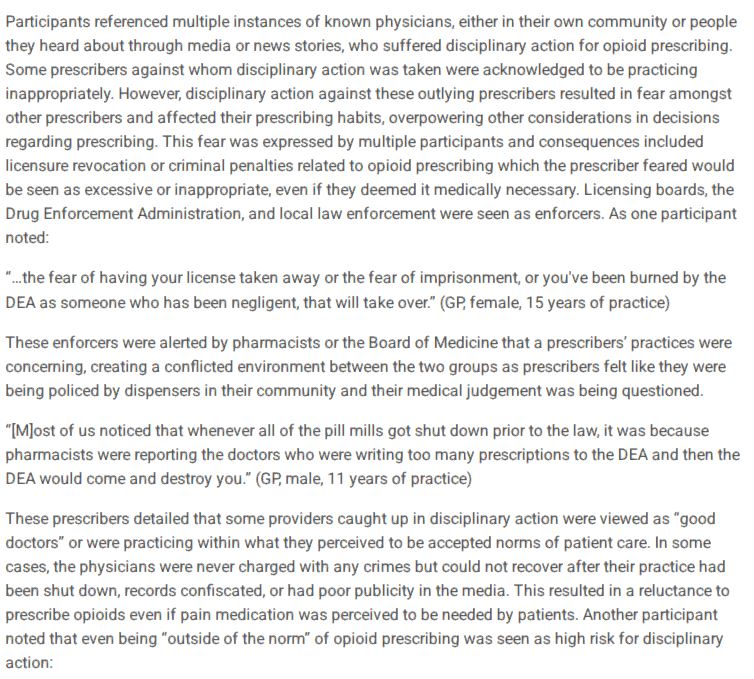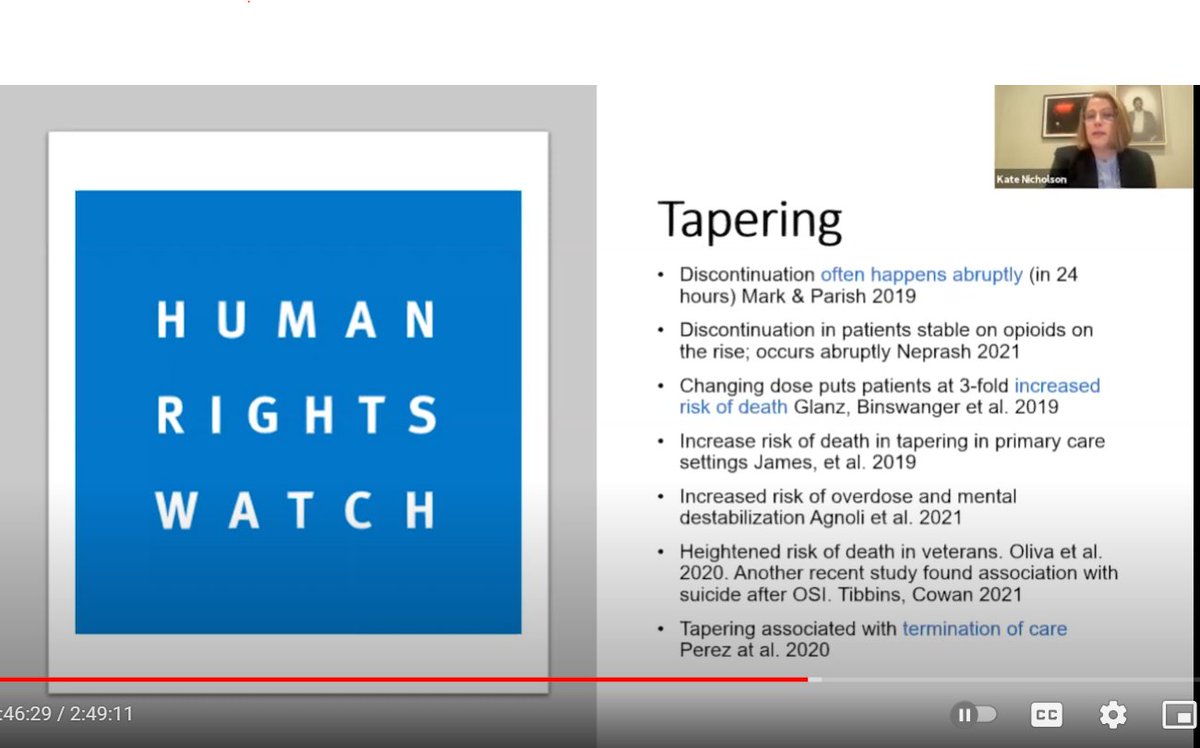
this study is incredible
https://twitter.com/national_pain/status/1454532038267219968
providers caught up in disciplinary action viewed as “good doctors” practicing within accepted norms of patient care.
physicians never charged with any crimes but could not recover after their practice had
been shut down, records confiscated, or had poor publicity in the media🤯
physicians never charged with any crimes but could not recover after their practice had
been shut down, records confiscated, or had poor publicity in the media🤯

“They were coming in and busting a lot of docs and then making it so… that we didn't need that law to be
afraid.”
#chronicpain #opioids #WestVirginia #health #healthcare #disability #medtwitter #Pharmacist
afraid.”
#chronicpain #opioids #WestVirginia #health #healthcare #disability #medtwitter #Pharmacist

SB 273, while implemented to address opioid over-prescribing, was viewed as exacerbating the fear
already being experienced by prescribers, and for which prescribers had already changed their practice.
already being experienced by prescribers, and for which prescribers had already changed their practice.
Participants felt the law had minimal impact because most prescribers had already
curtailed prescribing.
This law prompted further, more extreme changes in practice amongst physicians
otherwise felt they were practicing appropriately, such as cessation of all opioid prescribing
curtailed prescribing.
This law prompted further, more extreme changes in practice amongst physicians
otherwise felt they were practicing appropriately, such as cessation of all opioid prescribing

The prevailing view of participants was that all of the outlying or“irresponsible” prescribers had already been dealt with prior to SB 273. The law led many prescribers to further curtail opioid prescriptions, and in some cases, refuse to prescribe any controlled substance
“[SB 273] ended up affecting mostly the responsible prescribers of opioids. The people who were already
doing due diligence ended up being the ones who were concerned about the law because all the
irresponsible prescribers I think were already getting obliterated.” #chronicpain
doing due diligence ended up being the ones who were concerned about the law because all the
irresponsible prescribers I think were already getting obliterated.” #chronicpain

chilling effect” instigated by fear of disciplinary action and exacerbated by SB 273 created a dearth of
prescribers willing to provide opioid prescriptions
occurred even as the need for opioid medication was recognized within the prescriber community. 😮
prescribers willing to provide opioid prescriptions
occurred even as the need for opioid medication was recognized within the prescriber community. 😮
“There was a dramatic reduction in the number of physicians in the area who were writing anything
controlled. It didn't matter if it was a schedule 2 or a schedule 5. They just said, "No, I'm not going to do
this. I'm not putting my license on the line"
(GP, 10 years of practice)
controlled. It didn't matter if it was a schedule 2 or a schedule 5. They just said, "No, I'm not going to do
this. I'm not putting my license on the line"
(GP, 10 years of practice)

The last part is mind-blowing, showing the narrative accounts & word of mouth stories regarding physicians abandoning patients is entirely real & true🤕
#chronicpain #opioids #healthcare #health #medtwitter
#chronicpain #opioids #healthcare #health #medtwitter
Created care shifts and treatment gaps, particularly for chronic pain patients
“Every time a physician is raided or arrested, we get several hundred referrals of those patients who are,
either appropriately, or inappropriately on opioids that we have to sort out.”
“Every time a physician is raided or arrested, we get several hundred referrals of those patients who are,
either appropriately, or inappropriately on opioids that we have to sort out.”

Treatment gaps in chronic opioid management represented de facto patient abandonment amongst
prescribers who stopped prescribing due to fear of disciplinary action in light of the new legislation. Some
general practice physicians refused to treat chronic pain completely.
prescribers who stopped prescribing due to fear of disciplinary action in light of the new legislation. Some
general practice physicians refused to treat chronic pain completely.
this is the most interesting part of the study:
The perception of many prescriber participants was that patients who were left without opioids transitioned to illicit substances such as heroin.
#chronicpain #drugs #opioids #harmreduction
The perception of many prescriber participants was that patients who were left without opioids transitioned to illicit substances such as heroin.
#chronicpain #drugs #opioids #harmreduction

“They show up at my door a year later, using heroin for a year saying, ‘I need help.’
I said, ‘Well,what happened?’
‘Well, I was getting a legitimate prescription, and then they stopped’ And it's definitely, a lot more now than what it was before this legislation.”
I said, ‘Well,what happened?’
‘Well, I was getting a legitimate prescription, and then they stopped’ And it's definitely, a lot more now than what it was before this legislation.”

“That was a big problem and a big oversight on behalf of law enforcement and the physician community… We didn't have a good plan when we got these doctors down. We didn't- we didn't go in and find all these patients and… pick up the pieces from these patients."
"So that we could appropriately taper them and in a way that managed their withdrawal symptoms and their dependency without them turning to the illicit market.
And I think that's a big source of a lot of our problems.” 🤦 #chronicpain #opioids #westvirginia #health #medtwitter
And I think that's a big source of a lot of our problems.” 🤦 #chronicpain #opioids #westvirginia #health #medtwitter

Pls share🙏📧
Study confirms so many hypothesis about the opioid crisis that we only guessed at & now know is true
@StefanKertesz @headdock @national_pain @speakingabtpain @DanLairdMD @PainNewsNetwork @DocBearOMD @tal7291 @lawhern1 @jacobsullum @JonelleElgaway @RonChapmanAtty
Study confirms so many hypothesis about the opioid crisis that we only guessed at & now know is true
@StefanKertesz @headdock @national_pain @speakingabtpain @DanLairdMD @PainNewsNetwork @DocBearOMD @tal7291 @lawhern1 @jacobsullum @JonelleElgaway @RonChapmanAtty
@threadreaderapp unroll
• • •
Missing some Tweet in this thread? You can try to
force a refresh







